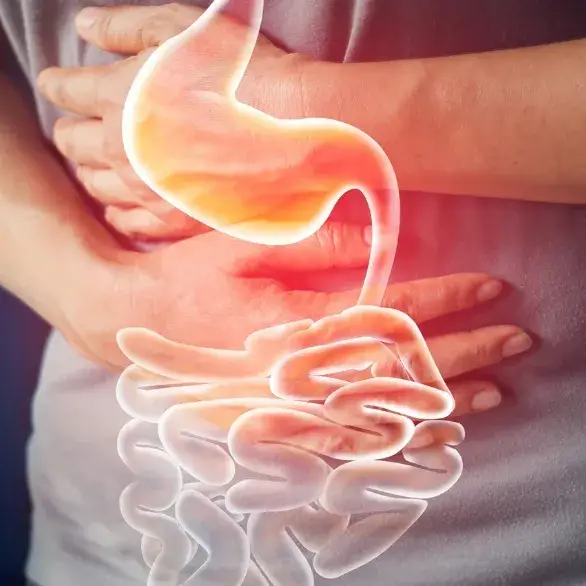Above Photo Credit: obtained from https://www.chfusa.com/blog/how-pineapples-can-help-gut-health/
In our last post, we talked about different strategies for managing the gut-brain connection. But what do you do if the techniques we talked about don’t work? You still need to eat, even if your stomach is upset from anxiety.
In this article, we’ll discuss what to eat when you’re feeling anxious, what foods to avoid with an anxious stomach, and some herbal remedies that may help calm an anxious stomach.
Free Your Gut:
What to Eat on an Anxious Stomach
As we discussed in our last post, anxiety can trigger your fight-or-flight response. This can lead to bothersome symptoms like lack of appetite, nausea, bloating, diarrhea, and constipation.
While it may seem like a stressful task, the methodical nature of cooking can be a calming activity that can ease your anxiety. If you’re feeling up to cooking, opt for nutrient dense foods like vegetables, whole grains, and proteins.
Here are some soothing meals to try when you’re feeling anxious:
Tomato soup and grilled cheese sandwich
There’s just something soothing about the classic soup and sandwich combo. Tomato soup is a great option because you can make it using a few ingredients you likely have in your pantry already. Sauté some onions, garlic, and olive oil, then add a can of diced tomatoes along with some dried herbs (such as oregano, thyme, and basil). Simmer for 15 minutes, then blend using an immersion blender (skip this step if you feel like a more rustic soup). Serve with a grilled cheese sandwich for a balanced and soothing meal.
Risotto
If you’re looking for a dish that’s soothing to make, look no further than risotto. Yes, it does take a while to cook. But most of the time spent in the kitchen is simply stirring. The rhythm and methodical nature of cooking risotto can be truly meditative, and the reward is a comforting dish that tastes like something you’d get at a restaurant. The best part? You can make a large portion and save the leftovers for days you don’t feel like cooking.
Chilli
Chilli is another classic comfort food that can be made using ingredients you likely already have at home. Combine onion, garlic, diced tomatoes, canned beans, and ground beef, pork, or poultry with spices like chilli powder and cumin, and you’re set. No ground meat? Simply omit and opt for a veggie-style chilli instead. If you don’t feel like spending time in the kitchen, chilli is a dish you can easily cook in the slow cooker instead.
Happy Stomach:
How to Calm a Nervous Stomach
In addition to eating a well-balanced diet, there are certain herbs that may ease a nervous stomach. Two of these include ginger and peppermint.
Ginger for a Nervous Stomach
Ginger is commonly used in traditional medicine to treat indigestion, nausea, and vomiting. Studies show that ginger may help speed up stomach emptying and promotes contractions in the gut which help with digestion. Try drinking ginger tea to soothe an anxious stomach.
Peppermint for a Nervous Stomach
Peppermint is another herb that is commonly used in traditional medicine to treat nausea and stomach pain. Studies suggest that for people with IBS, enteric-coated peppermint oil capsules may lead to a significant improvement in abdominal pain, bloating, and gas. Even if you don’t have IBS, peppermint can still be an option for soothing an anxious stomach.
There are many ways you can incorporate peppermint into your routine. The easiest way is by drinking peppermint tea. If you’re prone to heartburn, you may want to try enteric-coated peppermint oil capsules instead. These capsules release the peppermint oil directly in your intestines rather than in your stomach, which can help prevent heartburn and indigestion.
Don’t Feed Your Anxiety:
What to Avoid on an Anxious Stomach
When you’re dealing with anxiety, the last thing you want to do is feed that anxiety with what you’re eating and drinking. Two common culprits that can worsen anxiety are alcohol and caffeine.
Alcohol
For many people, there’s nothing wrong with unwinding with the occasional alcoholic beverage. But when you come to rely on it to relax, it may be worth reconsidering your relationship with alcohol.
While alcohol can initially relax you, it changes the levels of serotonin and other neurotransmitters in the brain, and can actually end up worsening anxiety, especially as the effects of alcohol start to wear off.
If you’re struggling with anxiety, it may be best to avoid alcohol altogether as you work with your care team to get your anxiety under control.
Caffeine
Caffeine is typically used to increase alertness. It’s also known to trigger the release of adrenalin, which can increase energy.
Everyone has different caffeine thresholds, and for some people, caffeine consumption can lead to increased anxiety symptoms such as nervousness, restlessness, trouble sleeping, fast heart rate, and gastrointestinal problems.
If you’re struggling with anxiety, it may be worth experimenting with your caffeine intake to see whether reducing caffeine intake improves your symptoms of anxiety.
Final Thoughts
Anxiety can often lead to bothersome symptoms like an anxious stomach. Luckily, cooking a soothing meal can be a wonderful way to relax and unwind. If you’re struggling with an anxious stomach, you may also find herbs like ginger and peppermint helpful.
If you’re struggling with anxiety and are looking to reduce your caffeine or alcohol intake, or ideas for soothing meals you can make, our team of dietitians and therapists at Journey to Health can help. Book a free consultation call today!
Copyright © 2022 Journey to Health – All Rights Reserved.






